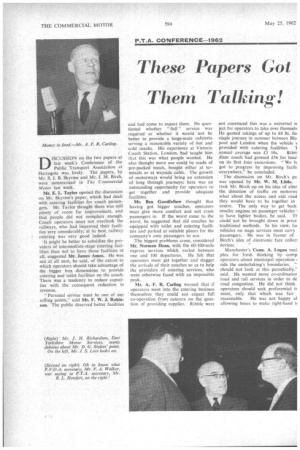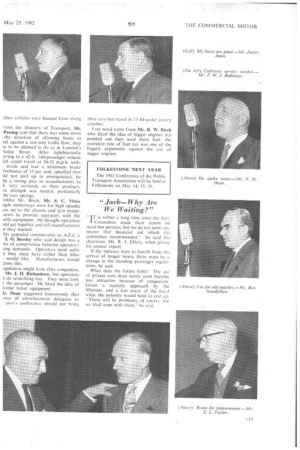These Papers Got Them Talking!
Page 44

Page 45

If you've noticed an error in this article please click here to report it so we can fix it.
DISCUSSION on the two papers at last week's Conference of the Public -Transport Association at Harrogate was lively. The papers, by Mr. S. J. B. Skyrme and Mr. J. M. Birch,were summarized in The Commercial Motor last week.
Mr. E. L. Taylor opened the discussion on Mr. Skyrme's paper, which had dealt with catering facilities for coach passengers. Mr. Taylor thought there was still plenty of room for improvement, and that people did not complain enough. Coach operators Must not overlook the railways, who had improved their facilities very considerably; at its best, railway catering was very good indeed.
It might be better to subsidize the providers of interniediate-stage catering facilities than not to have those facilities at all, suggested Mr. James Amos. He was not at all sure, he said, of the extent to which operators should take advantage of the bigger box dimensions to provide catering and toilet facilities on the coach. There was a tendency to reduce capacities with the consequent reduction in revenue.
"Personal service must be one of our selling points," said Mr. F. W. J. Robinson. The public deserved better facilities
and had come to expect them. He questioned whether " full " service was required or whether it would not be better to provide a large-scale cafeteria serving a reasonable variety of hot and cold snacks. His experience at Victoria Coach Station, London, had taught him that this was what people wanted. He also thought more use could be made of pre-packed meals, bought either at terminals or at wayside cafes. The growth of motorways would bring an extension of long through journeys; here was an outstanding opportunity for operators to get together and provide adequate facilities.
Mr. Ben Goodfellow thought that having got bigger coaches, operators must give more comfort and not cram passengers in. If the worst came to the worst, he suggested that old coaches be equipped with toilet and catering facilities and parked at suitable places for the company's own passengers to use.
The biggest problems arose, considered Mr. Norman Dean, with the 60-100-mile express services which varied between one and 100 departures. He felt that operators must get together and stagger the arrivals of their coaches so as to help the providers of catering services, who were otherwise faced with an impossible peak.
Mr. A. F. R. Carling warned that if operators went into the catering business themselves they could not expect full co-operation from caterers on the question of providing supplies. Ribble were not convinced this was a universal st ject for operators to take over themselx He quoted takings of up to £4 8s. fa single journey in summer between Bla pool and London when the vehicle providedwith catering facilities. 1
annual average was £3 16s. Ribbl diner coach had grossed £56 for June on its first four excursions. 'We h; got to progress by improving facili everywhere," he concluded.
The discussion on Mr. Birch's pa was opened by Mr. W. M. Little. took Mr. Birch up on his idea of alter the direction of traffic on motorwr. what about the access and exit road they would have to be together in centre. The only way to get back smaller engines on passenger vehicles , to have lighter bodies, he said. TI could not be brought down in price traditional methods. In his view, la; vehicles on stage services must carry passengers. He was in favour of Birch's idea of electronic fare collee devices.
Manchester's Coon. A. Logan mad plea for fresh thinking by comp operators about municipal operation side the undertaking's boundaries. " should not look at this parochially," said. He wanted more co-ordinatior road and rail services in order to de road congestion. He did not think operators should seek preferential tr ment, only that which was fair reasonable. He was not happy at allowing buses to make right-hand ti =Tom the Ministry of Transport, Mr. Perring said that there was some move the direction of allowing buses to vet against a one-way traffic flow; they re to be allowed to do so in London's .keley Street. After lightheartedly zrring to a 42-ft. 140-passenger vehicle ich could travel at 50-55 m.p.h. withstrain and had a minimum brake forrnance of 15 per cent. specified (but id not pull up in emergencies), he de a strong plea to manufacturers to k very seriously at their products, re strength was needed. particularly -he'rear springs.
Jnlike Mr. Birch, Mr. S. C. Vince ught motorways were for high speeds; ,ias up to the chassis and tyre manuurers to provide operators with the able equipment. He thought operators uld get together and tell manufacturers Lt they wanted.
his appealed considerably to A.E.C.'s J. 0. Rowley who said design was a ter of compromise between operators' ring demands. Operators must settle ,t they must have rather than what would like. Manufacturers would :ome this.
egulation might look after congestion, Mr. J. H. Richardson, but operators t do something too. They must look r the passenger. He liked the idea of tronic ticket equipment.
Ir. Dean suggested humorously that way of advertisement, delegates to year's conference should not bring
their cars but travel in 15 44-seater luxury coaches.
Last word came from Mr. R. W. Birch who liked the idea of bigger engines but pointed out they used more fuel; the excessive rate of fuel tax was one of the biggest arguments against the use of bigger engines.
"Jack—Why Are We Waiting?"
"IT is rather a long time since the Jac!: Committee made their report on rural bus services, but we do not seem any nearer that financial aid which ih.! committee recommended." So said 012. chairman, Mr. R. J. Ellery, when givin.o. his annual report.
lf the industry were to benefit from tl-Q arrival of longer buses, there must bc change in the standing passenger regulations, he said.
What does the future hold? The use of private cars must surely soon become less attractive because of congestion. Given a realistic approach by the Minister, and a fair crack of the fiscal whip, the industry would hold its end up. 'There will be problems. of course, but we shall cone with them," he said.












































































































